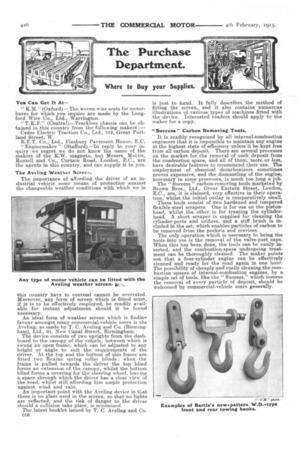The Purchase Department.
Page 20

If you've noticed an error in this article please click here to report it so we can fix it.
Where to Buy your Supplies.
You Can Get It At " (Oxford).—The woven-wire seats for motor
buses for which you inquire are made by the Longford Wire Co., Ltd., Warrington.
" T.K.F." (Central).—Trackless chassis can be obtained in this country from the following makers :— Cedes Electric Traction Co., Ltd., 112, Great Portland Street, W. R.E.T. Co., Ltd., Finsbury Pavement House, E.C. " Enginemaker " (Stafford).—In reply to your inquiry we regret we do not know the name of the makers of the K.W. magneto, but Messrs. Morris, Russell and Co., Curtain Road, London, E.G., are the agents in this country, and can supply it to you.
The Aveling Weather Screen.
The importance of affording the driver of an industrial vehicle some means of protection against the changeable weather conditions with which we in this country have to contend cannot be overrated. Moreover, any form of screen which is fitted must, if it is to be effectively employed, be readily available for instant adjustment should it be found necessary.
An ideal form of weather screen which is findinct favour amongst many commercial-vehicle users is the Aveling, as made by T. C. Aveling and Co. (Birmingham), Ltd., 91, New Canal Street, Birmingham.
The device consists of two uprights from the dashboard to the canopy of the vehicle, between which is swung an open frame, which can be adjusted to any height or angle to suit the• requirements of the driver. At the top and the bottom of this frame are fitted two Rexine spring roller blinds ; when the frame is pulled towards the driver the top blind forms an extension of the canopy, whilst the bottom blind forms a covering for the steering wheel, leaving a space through which the driver has a. clear view of the road, whilst still affording him ample protection against wind and rain.
An important point with the Aveling device is that there is no glass used in the screen, so that no lights are reflected, and the risk of danger to the driver should a collision take place, is minimized.
The latest booklet issued by T. C. Aveling and Co. 016
is just to hand. It fully describes the method of fitting the screen, and it also contains numerous illustrations of various types of machines fitted with the device. Interested readers should apply to the maker for a copy.
"Success" Carbon Removing Tools.
It is readily recognized by all internal-combustion engineers that it is impossible to maintain any engine at the highest state of efficiency unless it be kept free from all carbon deposit. There are several processes on the market for the removal of such deposit from the combustion space, and all of them, more or less, have desirable features to recommend their use. The employment of chemical decarbonizers sometimes proves expensive, and the dismantling of the engine, necessary in some processes, is much too long a job.
The ' Success " carbon-removing tools marketed by Brown Bros., Ltd., Great Eastern Street, London, i
E.G., are, it s claimed, very effective in their operation, whilst the initial outlay is comparatively small. These tools consist of two hardened and tempered flexible-steel scrapers. One is for use on the pistonhead, whilst the other is for treating the cylinderhead. A short scraper is supplied for cleaning the cylinder-ports and orifices, and a stiff brush is included in the set, which enables particles of carbon to be removed from the pockets and crevices.
The only operation which is necessary to bring the tools into use is the removal of the valve-port caps. When this has been done, the tools can be easily inserted, and the combustion-space undergoing treatment can be thoroughly cleaned. The maker points out that a four-cylinder engine can be effectively cleaned and ready for the road again in one hour. The possibility of cheaply and easily cleaning the combustion spaces of internal-combustion engines, by a simple set of tools. like the " Success," which insures the removal of every particle of deposit, should be welcomed by commercial-vehicle users generally.






















